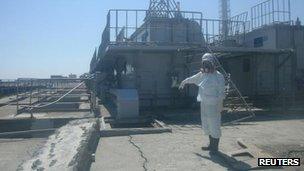Japan unveils plan to phase out nuclear power
- Published

Public opposition to nuclear energy has soared following the Fukushima nuclear crisis
The Japanese government has unveiled a plan to phase out nuclear power by 2030, in a major policy shift after last year's Fukushima disaster.
Under proposals put forward by a government panel, the reactors would be shut down completely by the year 2040.
Before the Fukushima disaster, nuclear power supplied about a third of Japan's energy needs.
Japan aims to increase the use of renewable energy and import more oil, coal and gas for its power needs.
The plan faces strong opposition from businesses. Before the nuclear disaster, Japan had wanted to raise its nuclear energy use to 50% by 2030.
"There is no way we can accept this - I cannot think this is technologically possible," Hiromasa Yonekura, chairman of the Keidanren (Japan Business Federation), was quoted by AFP news agency as saying.
Nuclear energy has become a key public issue in Japan.
Nuclear plants were shut down for safety checks in the wake of the March 2011 earthquake and tsunami which led to the Fukushima nuclear disaster. The restart of reactors in the town of Ohi in July sparked large public protests.
Prime Minister Yoshihiko Noda, who had previously urged a return to nuclear power, could face a general election later this year. Whether a future administration would back the same energy policy is not clear.
'Key pillars'
The panel said energy policy would be overhauled.
"Based on facing the reality of this grave accident and by learning lessons from the accident, the government has decided to review the national energy strategy from scratch," a policy document said.
"One of the key pillars of the new strategy is to achieve a society that does not depend on nuclear energy as soon as possible."
Under the proposals, nuclear reactors would be shut down after 40 years and new ones would no longer be built.
Reactors may also be restarted before they are phased out - something Mr Noda has pushed for in order to meet energy needs - but only if they meet strict safety standards from a new regulatory agency.
The government says it plans to utilise more renewable energy sources, increase investment in renewables and look for cheaper sources of LNG and other fossil fuels.
- Published30 August 2012
- Published17 July 2012
- Published5 July 2012
- Published29 February 2012